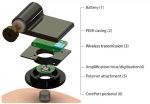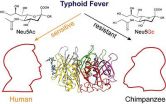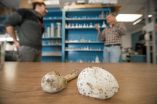Approved breast cancer drug offers hope for the treatment of blood disorders
2014-12-04
(Press-News.org) Blood cancers are more common in men than in women, but it has not been clear why this is the case. A study published by Cell Press December 4th in Cell Stem Cell provides an explanation, revealing that female sex hormones called estrogens regulate the survival, proliferation, and self-renewal of stem cells that give rise to blood cancers. Moreover, findings in mice with blood neoplasms--the excessive production of certain blood cells--suggest that a drug called tamoxifen, which targets estrogen receptors and is approved for the treatment of breast cancer, may also be a valuable strategy for blocking the development of blood neoplasms in humans.
"Our study demonstrates that targeting estrogen signaling with a clinically approved drug, at doses with an acceptable toxicity profile in humans, provides a novel potential therapeutic strategy for a set of neoplasms currently without a definitive cure," said senior study author Simón Méndez-Ferrer of the National Center for Cardiovascular Research (CNIC) in Madrid, Spain.
Myeloproliferative neoplasms cause large numbers of abnormal white blood cells to be produced and enter the bloodstream, potentially causing life-threatening symptoms. These diseases can lead to cancer and arise from blood cells called hematopoietic stem/progenitor cells (HSPCs), which give rise to all of the other blood cells. Leukemia and other blood cancers are more common in men than in women, strongly suggesting that sex hormones such as estrogens contribute to the development of these malignancies. But until now, it has not been clear whether estrogen signaling could directly control normal and cancerous HSPCs.
In the new study, Méndez-Ferrer and Abel Sánchez-Aguilera of CNIC found that HSPCs express estrogen receptors, and activation of these receptors with tamoxifen affected the survival, proliferation, and self-renewal of these cells. In mice with a genetic mutation associated with blood neoplasms, tamoxifen treatment blocked the excessive production of blood cells by restoring normal levels of programmed cell death in mutant cells. Moreover, tamoxifen enhanced the effects of conventional chemotherapy on cancerous cells in a mouse model of leukemia.
"Our results suggest that tamoxifen, at a similar dose used for the treatment of other diseases, might be useful to treat myeloproliferative neoplasms at various stages, without being toxic to normal blood cells," Méndez-Ferrer says. "The fact that this drug is FDA-approved, readily available and sufficiently safe facilitates the potential translation of our results from the bench to the bedside."
INFORMATION:
Cell Stem Cell, Sanchez-Aguilera et al.: "Estrogen signaling selectively induces apoptosis of hematopoietic progenitors and myeloid neoplasms without harming steady-state hematopoiesis"
ELSE PRESS RELEASES FROM THIS DATE:
2014-12-04
In a breakthrough study to be published on the December 4th issue of the prestigious scientific journal Cell, a research team led by Miguel Soares at the Instituto Gulbenkian de Ciência (IGC; Portugal) discovered that specific bacterial components in the human gut microbiota can trigger a natural defense mechanism that is highly protective against malaria transmission.
Over the past few years, the scientific community became aware that humans live under a continuous symbiotic relationship with a vast community of bacteria and other microbes that reside in the gut. ...
2014-12-04
This discovery has a potential application in the treatment of certain blood disorders for which there is currently no cure. The study was led by Dr. Simón Méndez-Ferrer of the CNIC, working in partnership with the laboratories of Doctors Jürg Schwaller and Radek Skoda of the University Hospital in Basel (Switzerland). The study's authors have demonstrated in mice that tamoxifen, a drug already approved and widely used for the treatment of breast cancer, blocks the symptoms and the progression of a specific group of blood disorders known as myeloproliferative ...
2014-12-04
PROVIDENCE, R.I. [Brown University] -- In a study in the journal Neuron, scientists describe a new high data-rate, low-power wireless brain sensor. The technology is designed to enable neuroscience research that cannot be accomplished with current sensors that tether subjects with cabled connections.
Experiments in the paper confirm that new capability. The results show that the technology transmitted rich, neuroscientifically meaningful signals from animal models as they slept and woke or exercised.
"We view this as a platform device for tapping into the richness of ...
2014-12-04
The bacterium Salmonella Typhi causes typhoid fever in humans, but leaves other mammals unaffected. Researchers at University of California, San Diego and Yale University Schools of Medicine now offer one explanation -- CMAH, an enzyme that humans lack. Without this enzyme, a toxin deployed by the bacteria is much better able to bind and enter human cells, making us sick. The study is published in the Dec. 4 issue of Cell.
In most mammals (including our closest evolutionary cousins, the great apes), the CMAH enzyme reconfigures the sugar molecules found on these animals' ...
2014-12-04
The link between obesity and cardiovascular diseases is well acknowledged. Being obese or overweight is a major risk factor for the development of elevated blood pressure, and cardiovascular diseases. But it has net been known how obesity increases the risk of high blood pressure, making it difficult to develop evidence based therapies for obesity, hypertension and heart disease.
In a ground-breaking study, published today in the prestigious journal, Cell (embargo midday EST), researchers from Monash University in Australia, Warwick, Cambridge in the UK and several American ...
2014-12-04
Leptin, a hormone that regulates the amount of fat stored in the body, also drives the increase in blood pressure that occurs with weight gain, according to researchers from Monash University and the University of Cambridge.
Being obese or overweight is a major risk factor for the development of high blood pressure and cardiovascular disease. Whilst a number of factors may be involved, the precise explanation for the link between these two conditions has been unclear.
In a study published today in the journal Cell, a research team led by Professor Michael Cowley, ...
2014-12-04
PHILADELPHIA--People with mental illness are more likely to have been tested for HIV than those without mental illness, according to a new study from a team of researchers at Penn Medicine and the U.S. Centers for Disease Control and Prevention (CDC) published online this week in AIDS Patient Care and STDs. The researchers also found that the most seriously ill - those with schizophrenia and bipolar disease - had the highest rate of HIV testing.
The study assessed nationally representative data from 21,785 adult respondents from the 2007 National Health Interview Survey ...
2014-12-04
EAST LANSING, Mich. - Take two poisonous mushrooms, and call me in the morning. While no doctor would ever write this prescription, toxic fungi may hold the secrets to tackling deadly diseases.
A team of Michigan State University scientists has discovered an enzyme that is the key to the lethal potency of poisonous mushrooms. The results, published in the current issue of the journal Chemistry and Biology, reveal the enzyme's ability to create the mushroom's molecules that harbor missile-like proficiency in attacking and annihilating a single vulnerable target in the ...
2014-12-04
Some National Football League (NFL) players have been seeking out unproven stem cell therapies to help accelerate recoveries from injuries, according to a new paper from Rice University's Baker Institute for Public Policy. While most players seem to receive treatment within the United States, several have traveled abroad for therapies unavailable domestically and may be unaware of the risks involved, the paper found.
The paper is published in the 2014 World Stem Cell Report, which is a special supplement to the journal Stem Cells and Development and is the official publication ...
2014-12-04
Today's smartphones are designed to entertain and are increasingly marketed to young adults as leisure devices. Not surprisingly, research suggests that young adults most often use their phones for entertainment purposes rather than for school or work.
With this in mind, three Kent State University researchers, Andrew Lepp, Ph.D., Jacob Barkley, Ph.D. and Jian Li, Ph.D., and a Kent State graduate student, Saba Salehi-Esfahani, surveyed a random sample of 454 college students to examine how different types of cell phone users experience daily leisure.
The trio from ...
LAST 30 PRESS RELEASES:
[Press-News.org] Approved breast cancer drug offers hope for the treatment of blood disorders





